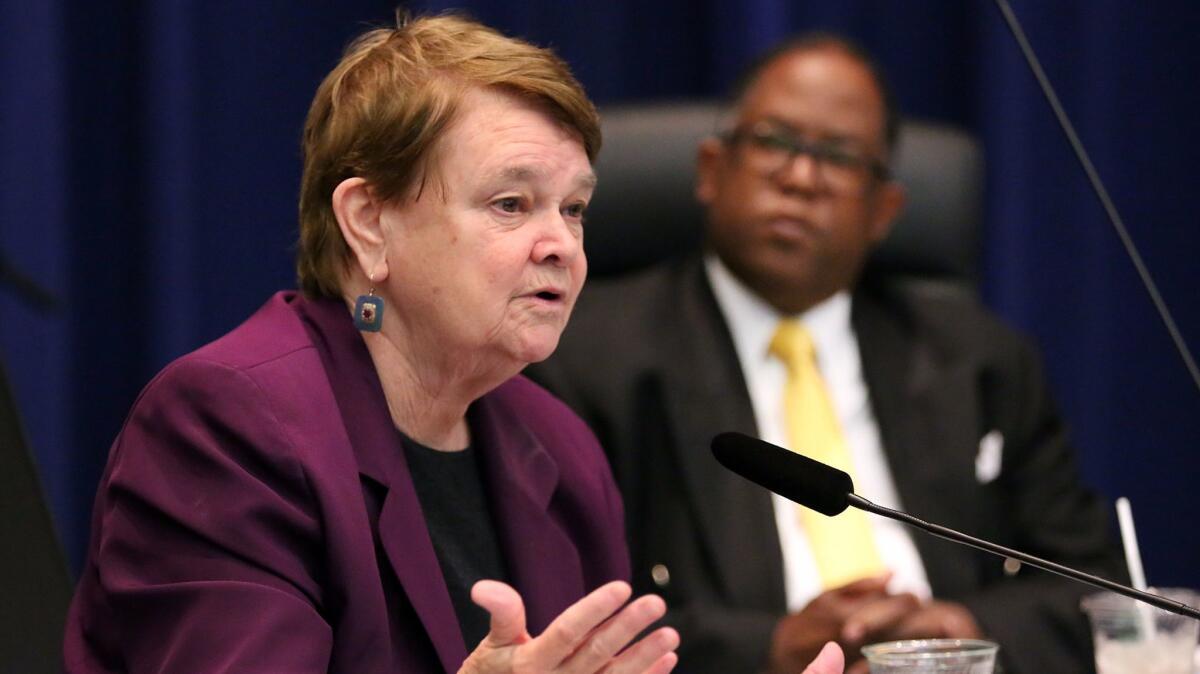L.A. County supervisors looking into how to discipline its bad workers

The Los Angeles County Board of Supervisors voted unanimously Tuesday to look for ways to make it easier to fire or reassign sheriff’s deputies, social workers and other county employees who have been dishonest or committed other serious misconduct.
The move comes amid high-profile cases that have shone a spotlight on county employees accused of dishonesty while on the job.
Sheriff Jim McDonnell has been pushing to fire deputies who were previously allowed to keep their jobs despite internal investigations showing they had lied. And four social workers and supervisors from the Department of Children and Family Services are facing trial on charges of child abuse and falsifying public records in the case of an 8-year-old boy who prosecutors say was tortured and killed by his mother and her boyfriend while under the county’s supervision.
Supervisor Sheila Kuehl, who co-sponsored Tuesday’s motion with Supervisor Mark Ridley-Thomas, said the goal is to make clear what conduct will result in termination for those responsible for public safety or where lives are at stake.
Kuehl noted that the county’s Civil Service Commission had in some cases overruled attempts to fire deputies who lied, which “made the sheriff kind of crazy and made us kind of crazy because we wanted those people out of there.”
The motion calls for the county’s chief executive to coordinate with other departments to decide whether civil service rules should be changed to allow the county to fire, demote or reassign employees if they have been found to have made false statements or omitted facts in internal investigations, including those who were already previously disciplined for misconduct.
It also called on county officials to examine which types of employees might be subject to the rule changes and who should be included on a list of problem workers provided to prosecutors in case they testify in court.
The union that represents rank-and-file deputies successfully went to court to block McDonnell from giving prosecutors the names of about 300 deputies on a similar so-called “Brady list.” The department compiled the list by examining the personnel files of deputies for evidence of “moral turpitude,” such as accepting bribes or gifts, misappropriating property, tampering with evidence, lying, obstructing investigations, falsifying records or using unreasonable force. The group represents about 3% of the department’s roughly 9,100 deputies.
County officials are expected to consult with union representatives and report back to the board within 60 days.
Supervisor Mark Ridley-Thomas said the motion aims to “protect the rights of good hardworking employees,” while also ensuring that employees who do not comply with the rules are not able to manipulate the system.
“It is not an attempt to violate employee rights. We protect them. We are exploring how we can ensure the highest level of public confidence and that our employees are doing what they are supposed to be doing and doing it well,” he said.
Mark-Anthony Johnson, health and wellness director for the activist group Dignity and Power Now, was one of seven advocates who spoke out in support of the motion. He also delivered a petition with 12,000 signatures urging the Los Angeles County Superior Court to allow the sheriff to release the names of the 300 deputies to the district attorney’s office.
“This motion would send a message to the unions. Sheriff McDonnell is trying to be transparent and the unions are undermining it,” Johnson said during his testimony.
Johnson said the motion could help expose “the harmful behavior of sheriff personnel experienced by our loved ones in and outside of the jails.”
The motion comes almost one year after the Board of Supervisors approved a series of steps to revamp the civil service hearing process.
Derek Hsieh, executive director of the Assn. for Los Angeles Deputy Sheriffs, the union that represents rank-and-file deputies, didn’t testify but watched the outcome of the vote.
“We knew this was something that was going to pass. We just want to make sure our rights are going to be protected,” Hsieh said.
“There were some speakers who were adamantly anti-law enforcement, but once you strip those folks out, there are certain groups who are concerned about the integrity of the process, and we get that,” he said.
Hsieh, however, said he would encourage the supervisors to examine the reasons that some employees were allowed to keep their jobs, saying they were sometimes the victims of unfairness.
“When we have seen discipline overturned, generally it’s the result of management not doing a good job of putting the case together or not having a case in the first place,” he said.
But for Melanie Ochoa, staff attorney at the ACLU of Southern California, the board’s action Tuesday marked an important reform.
“It’s the first step toward actually changing the policy, to allow the Civil Service Commission to take into account whether an officer should be on the force if their presence undermines confidence in the agency overall,” she said.
Follow me on Twitter @melissaetehad
ALSO
Civil rights groups alarmed at Justice Department’s review of local police settlements
L.A. County Sheriff’s Department switches from silver to gold belt buckles at a cost of $300,000
More to Read
Sign up for Essential California
The most important California stories and recommendations in your inbox every morning.
You may occasionally receive promotional content from the Los Angeles Times.











